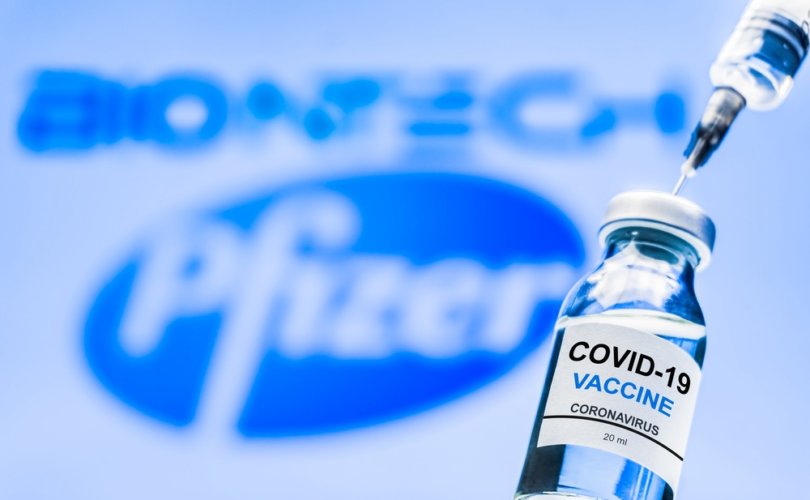WASHINGTON, D.C. (LifeSiteNews) – The U.S. Food and Drug Administration (FDA) has given its full approval to the abortion-tainted Pfizer/BioNTech COVID-19 vaccine, despite thousands of deaths and other serious adverse reactions being recorded by individuals who have received the jab.
The full permission, described by the agency as a “key achievement for public health,” comes despite the National Institutes for Health (NIH) estimating a trial completion date for testing the efficacy and safety of the jab to be around May 2, 2023, for the Pfizer shot.
The FDA had originally granted the mRNA jab emergency use authorization (EUA) in December, 2020, becoming the second “vaccine” technology of its kind to be permitted for emergency use in the U.S., after Moderna’s mRNA shot.
Now, the FDA has given its full approval to the jab, which has been renamed “Comirnaty” for marketing purposes, to individuals aged 16 and older. For those between 12 and 15 years of age, the EUA still applies. The FDA noted that “the administration of a third dose in certain immunocompromised individuals” will also still only be granted under the EUA protocol.
The FDA’s Acting Commissioner, Janet Woodcock, called the full authorization a “milestone” in the “battle” against COVID-19, and said that the jab had met “rigorous, scientific standards,” even for its original EUA status granted just eight months prior. Given its new approval, Woodcock said that the public “can be very confident that this vaccine meets the high standards for safety, effectiveness, and manufacturing quality the FDA requires of an approved product.”
Peter Marks, Director of the Center for Biologics Evaluation and Research at the FDA, said that the agency has conducted its own analyses into the safety and effectiveness of the jab, including the manufacturing process and facilities, which he characterized as “thorough.”
Though admitting that “we approved this vaccine expeditiously,” Marks said that the final approval “was fully in keeping with our existing high standards for vaccines in the U.S.”
The FDA press release noted that among 22,000 trial participants over 16 years of age, the jab showed 91 percent effectiveness “in preventing COVID-19 disease.” The statement also highlighted the apparent effectiveness of the vaccine in preventing “potentially serious outcomes [from COVID infection] including hospitalization and death,” but later stated that “[i]nformation is not yet available about potential long-term health outcomes.” The prescribing information provided with the now-approved drug will note these risks.
The FDA is requiring the manufacturer to monitor the risks of myocarditis and pericarditis (dangerous inflammations of the heart) following use of its mRNA jab.
But heart problems are not the only health risks associated with the Pfizer jab. In fact, a staggering 326,535 adverse events arising after taking the mRNA shot have been reported to the FDA and CDC-run Vaccine Adverse Events Reporting System (VAERS). 92,002,656 have received both doses of the Pfizer jab, according to the CDC.
VAERS records show that, between December 14, 2020, and August 13, 2021, a total of 9,027 deaths have followed the use of Pfizer’s newly approved jab, as well as 12,358 permanent disabilities and 36,665 hospitalizations.
A total of 2,986 cases of myocarditis or pericarditis were reported following the Pfizer shot, at least 348 of which were in children between 12 and 17 years-of-age.
VAERS also recorded 504 cases of Guillain-Barré syndrome following Pfizer’s anti-COVID jab, a condition that affects the muscles, causing weakness and sometimes “devastating paralysis,” according to the NIH. Overall, the system reports show that 887 cases have been recorded after taking a COVID “vaccine,” meaning that Pfizer’s jab accounts for almost 57 percent of all instances of Guillain-Barré syndrome.
Additional dangers potentially associated with the Pfizer jab include anaphylactic reactions, a potentially life-threatening kind of allergic response, recorded some 85,655 times on VAERS, and 11,100 cases of blood clotting disorders, around 65 percent of all blood clot reports following COVID jabs. Pfizer’s shot is also correlated with 812 miscarriages or premature births.
Despite the myriad health problems occurring after taking the Pfizer jab, Woodcock maintained that “millions of people have already safely received COVID-19 vaccines,” which should give those who haven’t yet received the jab “additional confidence to get vaccinated.”
New research into the efficacy of the mRNA jabs against the Delta variant has shown a marked decrease in their ability to fight off infection with the virus. A review conducted by the Mayo Clinic showed that Pfizer’s shot has a mere 42 percent effectiveness against the Delta variant of the virus, bringing the efficacy below the 50 percent threshold for approval originally set by the FDA. The research is in the preprint stage, meaning it is yet to be peer-reviewed.
LifeSiteNews has produced an extensive COVID-19 vaccines resources page. View it here.

